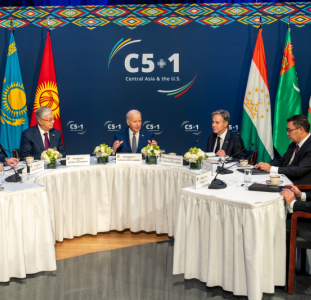In April 2009 the North Atlantic Alliance will celebrate its 60-th anniversary. But already today the Western political elite tries to judge the NATO role and position in the world security policy, and Alliance prospects in the XXI century. In this context, experts focus on recent informal consultations: The Dialogue of NATO States at the Branenburg Gate , conducted in Berlin and sponsored by the German Atlantic Society simultaneously with the VII-th Conference on International Security Policy Prospects. In the opinion of experts the speech of German Chancellor Angele Merkel was quite “revolutionary”. She urged the Atlantic community to revise the role of the North Atlantic Alliance in the contemporary world and its relations with Russia, and expressed doubts about expediency to admit Ukraine and Georgia to NATO.
Angele Merkel paid special attention to the need to restructure the Alliance at the present stage and approve a new program in place of the current one elaborated in 1999. A core of the proposed restructuring is the transfer of accents inside NATO from the military to political aspect. The military aspect that has been outdated by now but still prevails in NATO, has been specified in the respective internal documents of the Alliance. For example, the Strategic Concept of the Alliance adopted in 1999 outlines the global NATO responsibility area, and admits the use of force by NATO despite any decisions of the UN Security Council. In practice, the provisions of this Concept were applied during combat activities in Yugoslavia and later in Serbia, Kosovo, Iraq and Afghanistan.
Under the Strategic Concept of 1999 there should be doubts also about the intentions of NATO with respect to Russia. For example, what may be an advance direction for 20,000 tanks, 30,000 armored vehicles, 20,000 guns, about 7,000 tactical strike aircraft (including those with nuclear arms) and 2,000 helicopter gunships? There is only one answer: to the east.
Whose nuclear missile arsenal is the US GMD aimed at? What is a target of the Prompt Global Strike Concept approved by US President G. Bush in January 2003? The concept that provides a prompt strike (during 4-6 hours) by tens of thousands of cruise missiles. Of course, this target is Russia rather than North Korea or Iran.
Implementing the strategy aimed at destabilization of Russia as a potential US enemy in its struggle for the global hegemony, the USA today uses NATO capabilities to surround Russia with “colored” pro-American regimes, military bases, promote NATO enlargement, inspire conflicts in certain regions (Kosovo, South Ossetia), draw Ukraine and Georgia into NATO to make them situation destabilizating locos in the post-Soviet area, on the Russian borders.
However not all Alliance members like the NATO role as a vehicle of the American policy. For the fist time it was German Chancellor Angele Merkel who claimed it in public. In this context Germany also handles a main NATO problem – “the Afghanistan campaign”. In Afghanistan, the Germans want not just shoot and drop bombs but repair, build and train. Speaking about “a direct dependence of the success and worldwide respect of the Alliance on the developments in Afghanistan” Angele Merkel simultaneously made it clear that her country cannot render other assistance to the Alliance coalition in Afghanistan but deliver AWACS aircraft. As for further increase of the German contingent strength (last time it was done in November from 3500 up to 4500), which in the opinion of German experts will be a key item of future talks with the new US President, such increase will be hardly feasible.
So, Angele Merkel spoke about a key problem: the need to revise the global role of NATO in the XXI century, and transfer accents within NATO from the military to political aspect. In this context it is very important for us that the German Chancellor urged to radically revise the relations of the Alliance with Russia, and emphasized the need of “close and reliable cooperation with Moscow”. “The West and Russia need each other”, said the German leader. She explained that the revision of the NATO strategy with respect to Russia is mostly caused by the changes in the international situation because “today no one country of the world can manage the global problems alone”.
Of course, certain forces in the USA and NATO hardly agree with the proposal of Angele Merkel to establish close cooperation with Moscow. They also hardly agree with the statement of the German leader, who in her speech distinctly repeated the Bucharest thesis, according to which Ukraine and Georgia still fail to fulfill the NATO membership conditions and therefore they cannot be admitted to this Organization. It is very important that A. Merkel expressly clarified that she does not see any prospects of this membership “in the foreseeable future”.
Meanwhile the NATO leaders start understanding that the Alliance cannot solve many problems without Russia. For example, NATO Secretary General Jaap de Hoop Scheffer claimed at the 54-th NATO Parliamentary Assembly in Valencia on November 18 that the Alliance should revise its relations with Russia because they are “the best strategic asset , which is needed for the international security”. According to the NATO leader the Alliance and Russia may be united again by such common goals as “arms control, nonproliferation and war on terror”.
NATO Spokesman James Appathura claimed that ambassadors of NATO member states also admit resumption of Russia-NATO Council activity. “I believe that this item will be on the agenda of the December NATO foreign minister meeting in Brussels”, he said.
A general idea of mass media commentaries on the aforesaid problems is as follows: by the NATO anniversary date the leading EU states remaining adherent to “the transatlantic solidarity” will try to declare themselves as equal and sovereign partners of the USA both in the military and in the political aspect. And in so doing they will try to improve relations with our country within the framework of the Russia-NATO dialogue as much as possible.
Berlin political analyst Walter Neumann agrees with this thesis. He said about the prospects of “perestroika in NATO”: “My “weather forecast” is the following – “frost” is probable in the Russian direction at the December meeting of the NATO defense ministers. But by April thawing weather is expected in the relations with this country at the Jubilee NATO Summit unless a new crisis like the Caucasus one occurs again. In the period from this November to next April both parties are advised to take confidence-building measures with respect to each other. And Germany as a leading NATO state may initiate this process as it was confirmed by the speech of Frau Merkel”.









